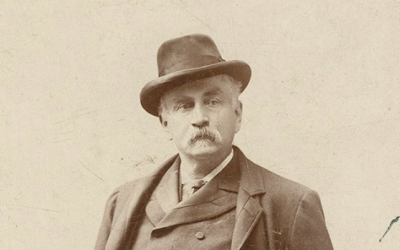The September 23, 1884, issue of The Daily State Journal at Lincoln included the following account of a local wedding: “Late Saturday evening H. E. Noble, the artist, received a telephone message from Ashland, asking him if it were possible for him to be at his studio next day when the train came in. He replied that if it was an urgent case he would be there. He was informed that the urgency would fully justify the demand made upon him. Fancying some devoted friends were about to part, it might be for years and it might be forever, and wanted some pictures to console themselves during the weary absence, Noble consented to be on hand.
“Sunday, just five minutes after the arrival of the train, two carriages drove up to the studio and a group of ladies, gentleman and children stepped on the sidewalk and mounted the stairs. They were well dressed, with an evident eye to the occasion, and hearing a remark about the preacher having been sent for, Noble concluded he was to have the artistic pleasure of photographing a wedding group while the ceremony was actually under way, so he went in and sensitized and prepared the biggest plate in the house and got otherwise ready. The preacher, Rev. C. C. Pierce, of the Baptist church arrived, and the parties to the matrimonial venture stood up and were duly united. The minister pocketed his fee and departed, and the others were in the act of following when Noble accosted the groom and inquired if he wanted pictures taken.
“‘On, no,’ he replied. [Noble asked,] ‘Well, what did you call me down to my place of business for on Sunday?’
“‘Oh,’ replied the groom, ‘we wanted to be married in the reception room of a gallery, and as my friends told me you were a very kind and obliging gentleman, I thought we would come up here to be spliced. I’m sure we are very much obliged to you.’ And the newly made benedict bowed himself blandly out, leaving Noble confirmed in the opinion that it takes all kinds of people to make a world.
“The names of the happy parties united for life under such unique circumstances are, or rather were, Asa Crane and Ella Harris. That their lot may be one of undisturbed good fortune THE JOURNAL heartily wishes and hereby casts after them an old shoe with all it implies.”



